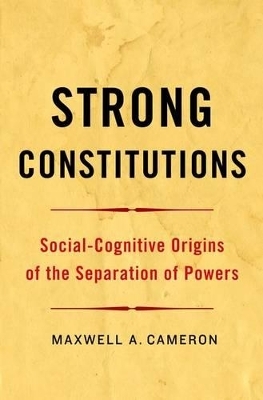
Strong Constitutions
Social-Cognitive Origins of the Separation of Powers
Seiten
2015
Oxford University Press Inc (Verlag)
978-0-19-023522-2 (ISBN)
Oxford University Press Inc (Verlag)
978-0-19-023522-2 (ISBN)
A bold argument that constitutional states are not weaker because their powers are divided -- they are often stronger because they solve collective action problems rooted in speech and communication.
The separation of powers is an idea with ancient origins, but nowadays it is largely relegated to legal doctrine, public philosophy, or the history of ideas. Yet the concept is often evoked in debates on the 'war' on terrorism, the use of emergency powers, or constitutional reform. Strong Constitutions boldly places the separation of powers on a social scientific footing, arguing that it emerged with the spread of literacy, became central to constitutional thought after the Gutenberg revolution, and faces unprecedented challenges in our current era of electronic communication. Constitutional states use texts to coordinate collective action, and they do so by creating governmental agencies with specific jurisdiction and competence over distinct types of power. Among them are the power to make decisions backed by legally sanctioned coercion; the deliberative power to make procedurally legitimate laws; and the judicial power to interpret and apply laws in particular circumstances. The division of government into three such branches enables state officials and citizens to use written texts-legal codes and documents, including constitutions-along with unwritten rules and conventions to coordinate their activities on larger scales and over longer time horizons.
Cameron argues that constitutional states are not weaker because their powers are separated. They are generally stronger because they solve collective action problems rooted in speech and communication. The book is a must read for anyone interested in the separation of powers, its origin, evolution, and consequences.
The separation of powers is an idea with ancient origins, but nowadays it is largely relegated to legal doctrine, public philosophy, or the history of ideas. Yet the concept is often evoked in debates on the 'war' on terrorism, the use of emergency powers, or constitutional reform. Strong Constitutions boldly places the separation of powers on a social scientific footing, arguing that it emerged with the spread of literacy, became central to constitutional thought after the Gutenberg revolution, and faces unprecedented challenges in our current era of electronic communication. Constitutional states use texts to coordinate collective action, and they do so by creating governmental agencies with specific jurisdiction and competence over distinct types of power. Among them are the power to make decisions backed by legally sanctioned coercion; the deliberative power to make procedurally legitimate laws; and the judicial power to interpret and apply laws in particular circumstances. The division of government into three such branches enables state officials and citizens to use written texts-legal codes and documents, including constitutions-along with unwritten rules and conventions to coordinate their activities on larger scales and over longer time horizons.
Cameron argues that constitutional states are not weaker because their powers are separated. They are generally stronger because they solve collective action problems rooted in speech and communication. The book is a must read for anyone interested in the separation of powers, its origin, evolution, and consequences.
Maxwell A. Cameron is Professor of Political Science and Director of the Centre for the Study of Democratic Institutions at the University of British Columbia.
List of Figures ; Acknowledgements ; Chapter 1. Introduction: Strong Constitutions ; Chapter 2. Social-Cognitive Origins of the Separation of Powers ; Chapter 3. Literacy and the Invention of Constitutions ; Chapter 4. The Printing Press and Constitutional Revolutions ; Chapter 5. Electronic Media, Mass Politics, and Electoral Democracy ; Chapter 6. Beyond Liberalism: Language, Law, and Deliberation ; Chapter 7. Democracy Without the Separation of Powers? ; Chapter 8. Conclusion: Writing, Power, and Democracy ; Bibliography
| Erscheint lt. Verlag | 14.5.2015 |
|---|---|
| Verlagsort | New York |
| Sprache | englisch |
| Maße | 152 x 232 mm |
| Gewicht | 396 g |
| Themenwelt | Geisteswissenschaften ► Philosophie |
| Recht / Steuern ► EU / Internationales Recht | |
| Recht / Steuern ► Öffentliches Recht | |
| Sozialwissenschaften ► Politik / Verwaltung ► Politische Theorie | |
| Sozialwissenschaften ► Politik / Verwaltung ► Staat / Verwaltung | |
| ISBN-10 | 0-19-023522-5 / 0190235225 |
| ISBN-13 | 978-0-19-023522-2 / 9780190235222 |
| Zustand | Neuware |
| Haben Sie eine Frage zum Produkt? |
Mehr entdecken
aus dem Bereich
aus dem Bereich
Buch | Softcover (2024)
Mohr Siebeck (Verlag)
39,00 €
ein Vortrag
Buch | Softcover (2024)
Suhrkamp (Verlag)
10,00 €


